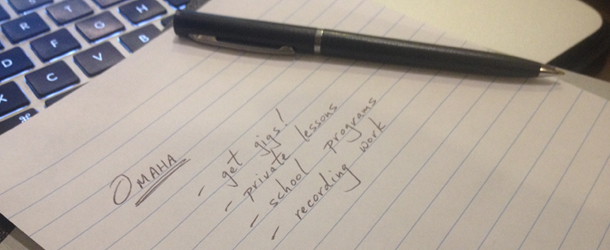[Editor’s note: Mark Powers is a percussionist, educator and soon-to-be Omahan. He will be documenting his move to Nebraska, a new musical marketplace, and in the process, hopes to offer advice on how other musicians can work hard to break into their scene.]
by Mark Powers
I can’t say that I’ve ever minded change all that much: especially geographic change. The act of moving, be it across the country, across town or just next door, tends to stress many people out. Relocating to a new place, not knowing many people, having to make new connections and virtually start all over again. It's a scramble to re-establish oneself, and it's a list of things that, for whatever reason, I thrive on.
Perhaps that is precisely why I love the ever-changing environment that a career in music has continued to bring me. I’ve said it for years: Music is my passport. Drumming, studying new world music styles, teaching about percussion rhythms and techniques and creating field recordings have allowed me to see the globe, from Africa to Asia to the South Pacific to the Middle East.
The career doesn’t require the travel: my heart does. The career allows for it. But I’ve had so many musicians argue this point with me over the years, saying that there’s not enough work “out there” to allow him/her to be “lucky” enough to follow those dreams of travel or what-have-you. I’m going on the record here to fully disagree and assure you that you really do get from the world what you put into it.
GO WEST, YOUNG MAN
When I first considered making the move to Oregon from Wisconsin more than seven years ago, numerous well-intentioned musician friends who had already “been there/done that” urged me to choose otherwise.
The musical marketplace was already saturated with an overabundance of terrific players; too many competing for too few gigs which meant it was impossible to break into the scene. Two good friends of mine went so far as to say, “I give you a year … you’ll see, and you’ll be back.”
A year later, I was freelancing with a variety of artists in the Portland and Salem areas, making money and making music nearly every weekend. My private percussion lesson roster had grown to 50 weekly students. School teachers were beginning to randomly invite me to visit and coach their percussionists.
When success in any given endeavor is attained by one individual and not by another, the latter is often quick to contribute that difference to one simple factor: luck. He/she got lucky; I didn’t. Well, I (via this new Hear Nebraska column) am here to tell you — no, prove to you — that that isn’t always necessarily the case. Does “luck” happen? Oh, absolutely. But, more often than not, what we perceive as luck only appears that way because we are unaware of all the work that someone has put in behind-the-scenes.
In The Art of War, Sun Tzu teaches that “opportunities multiply as they are seized.” Thomas Edison suggested that what could be thought of as luck is really just the result of an opportunity combined with adequate preparedness. I’m going to go a step further and demonstrate how we (and for our purposes, by “we” I mean “we musicians”) can actually create many valuable opportunities for ourselves.
Let’s not only jump at what comes our direction, let’s also choose what we bring our direction and, in doing so, define what our musical lives look like. Then watch as things really start multiplying.
NOW, HEAD EAST
I’m now only two months away from making another move — this time from Portland to Omaha — and friends have once again begun voicing their concerns about the decision. This time, however, for a slightly different reason. “Is there even a music scene over there?” or “Nebraska? But nothing at all is happening in that part of the country,” or “Um, dude … Omaha?!”
At the moment, I have no gigs, no students, no work lined up … but I also have to admit that I sort of enjoy the challenge ahead. The goal is fourfold:
1. Get hired [for pay] to perform live with bands in the area (yes, plural — this drummer needs some variety).
2. Build a private drum lesson roster (with, let’s say, no fewer than 20 students).
3. Book at least three full-day school percussion programs.
4. Contribute drum and/or percussion tracks to a local artist’s album release.
As you can see, I’ve got my work cut out for me. So here I go again. Time to prove the naysayers wrong. The difference this time is that you get to come along as I chronicle the process.
We’re going to hit the ground running, implementing some age-old methods musicians have always used to drum up gigs. We’re also going to take some non-traditional, guerrilla-like approaches that you might not usually think musicians utilize. Whether you’re a band or a sideman, a performer or an educator, a novice or a professional, I hope to share takeaways that you can apply in your own life and career.
This isn’t just my story; this is an ongoing workshop for all of us. Together, we’ll do some experimenting, ruffle some feathers and uncover what it really takes to break into the Omaha (or really, any) local music scene.
Plug in and tune up: I’m about to count this sucker off! Catch me right back here again in December and we’ll chat about the first stage in lining up some work around here — securing a place or two to teach private lessons — and why “no” doesn’t always mean you won’t get the gig.
Mark Powers is a Hear Nebraska contributor, drummer, percussion educator and Omaha newcomer. Reach him at PowersPercussion.com and powersdrums@gmail.com.




